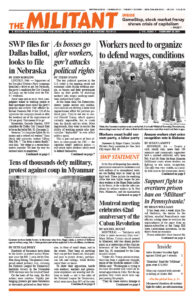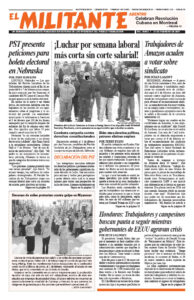A victory has been won. On Feb. 12 Diana Woodside, director of the Pennsylvania Department of Corrections’ office of Policy, Grants and Legislative Affairs, informed Militant attorney David Goldstein Feb. 12 that upon review Militant issue no. 1 “will be added [to] our Reviewed Publication List as ‘Permitted.’” and the paper will be delivered to the inmate.
It has been over a week since David Goldstein, the lawyer for the Militant, emailed Pennsylvania state officials asking them to overturn the impoundment of the paper from an inmate-subscriber at the Camp Hill State Correctional Institution. So far there’s been no response.
Prison authorities there banned the Jan. 4 issue of the paper. The Militant only found out about this when the inmate sent the editor a letter with a copy of the denial form. He said he planned to file an appeal of the ban and asked the paper to challenge it as well. The Militant did so.
“I understand that you will notify me if the Denial is reversed,” Goldstein wrote Diana Woodside, director of the Department of Corrections’ office of Policy, Grants and Legislative Affairs, Feb. 1, “or if your office requires a substantive appeal.”
The denial form claims an article on page 2 could “create a danger within the context of the correctional facility.” The only article on that page is “Workers in Scotland Speak Out Against Economic, Health Crisis.”
Then, in a “Brief Description” of the problem with the issue, the form says, “Socialist Workers Party Action, speaks on social unrest and standing against law enforcement.” Prison authorities are most likely referring to the “Socialist Workers Party Action Program” that appears on page 3, the election campaign platform of the SWP that the paper has run dozens of times over the past year for its candidates in both 2020 and 2021.
“We urge supporters of prisoners’ rights to join in urging the Department of Corrections to overturn this impoundment of the Militant,” said John Studer, the paper’s editor. “At issue are the rights of freedom of speech and of the press and the right of subscribers behind bars to have access to news and opinions that allow them to form and advocate political opinions.”
Some Militant readers and supporters of political rights have already written to Woodside. A letter from a prisoner-subscriber from Illinois said he had read the SWP Action Program in the paper and saw no problems with how it “spoke out against police brutality and social unrest within the country.”
“It would seem to me that your penal system would encourage your prisoners to engage in intellectual discourse relative to the proper function of government,” he wrote. “It should be the goal of every person — incarcerated or free — to see that the police are not killing unarmed citizens, and when they do, they should be held responsible for their crimes.”
The debate on these questions has been an important part of politics and media coverage across the country over the last year.
“More letters are needed,” said Studer. “Wherever the Militant has been banned by prison officials, the paper and supporters of political rights have fought back,” he said. “We’ve been successful in forcing the authorities to back off in most cases.”
Among those who have spoken out against previous efforts by prison authorities to bar the Militant are Amnesty International USA, National Lawyers Guild, PEN America, Reporters Committee for Freedom of the Press, Florida Press Association, American Civil Liberties Union of Florida, union officials and many others.
Letters urging the ban be reversed can be sent to Diana Woodside, 1920 Technology Parkway, Mechanicsburg, PA 17050. Email: dwoodside@pa.gov. Please send copies to the Militant.

